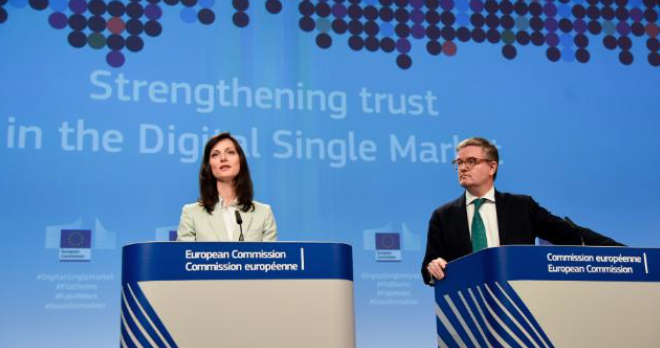European Commission’s plan to tackle online disinformation

The European Commissioner for Digital Economy and Society, Mariya Gabriel, presented today (26/04/2018) the Communication on “tackling online disinformation”. The European Federation of Journalists (EFJ) welcomes the commitment of the European Union to call on member states for significant financial support for independent news media, fact- and source-checking, and media and information literacy.
The European Federation of Journalistes strongly believes that quality journalism and a sustainable media ecosystem are the best antidotes to disinformation.
The European Commission recognises the key role played by online platforms in the spread and amplification of online disinformation, deeply affecting journalists and media outlets. It outlines four areas of actions:
- transparency of the origin of information and the way it is produced, sponsored and disseminated
- diversity of information
- credibility of information with the help of trusted flaggers
- inclusive solutions, including media literacy
Concretely, the European Commission announced the development of an EU-wide Code of Practice on disinformation, to be published by July 2018. This code will aim to commit platforms to reduce revenues for supplier of disinformation and to ensure transparency about sponsored content.
In addition, the Commission will support the creation of an independent European network of fact-checkers. It also showed strong commitment to increase funding opportunities and “support initiatives promoting media freedom and pluralism, quality news media, including skills, training for journalists, new technologies for newsrooms and collaborative data-driven platforms.”
Together with 38 experts, the EFJ participated in the HLEG set up by the European Commission in January 2018 and insisted on the fact that the main responsibility is on the online platforms. The group delivered a report in March 2018 proposing a set of actions to safeguard the diversity and sustainability of the European news media ecosystem.
Additionally, the Nordic Council of Ministers created a booklet to address disinformation and “fake news”. It comprises contributions of experts with a focus on media and information literacy, ethical standards and quality journalism. The booklet will be launched at the UNESCO World Press Freedom Day 2018 in Accra.
Credit photo: European Union, 2018






